Menu
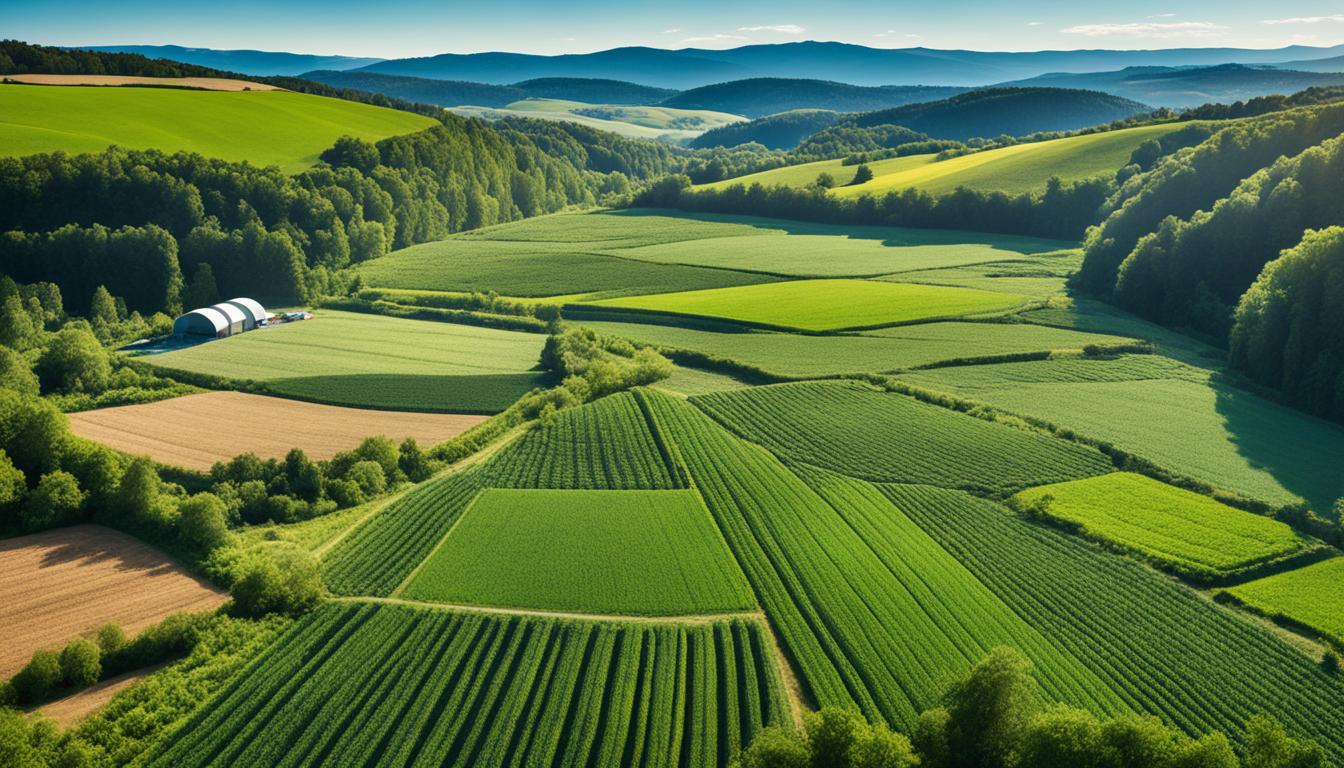
Major crops such as maize, rice, wheat, and soybean are not growing fast enough to feed the world. Every year, their yields increase by 1.6%, 1.0%, 0.9%, and 1.3% respectively. This is less than the 2.4% needed because the population is growing. By 2030, we may have 9 billion people and the planet will be warmer. This is a big problem.
Biotechnology plays a key role in making farming sustainable. It combines looking after the environment with making sure farms are productive and fair to everyone. This approach is crucial for our future food security. Through biotechnology, we can grow crops that can survive pests and have more nutrition. This helps increase both the quantity and quality of our food.
New technologies like crops that resist weed killers make farming easier. They are just the start of what biotechnology can do. For example, Golden Rice shows us how we can make food more nutritious. This is a step beyond just growing more food.
But, people might not trust new biotechnologies. We also have to make sure we protect the variety of life on Earth. With so many people and changes in our climate, we really need what biotechnology can offer. It’s key for food security and making sure farming lasts for the long run.
Agricultural biotechnology is changing the way we farm. It uses advanced biotech methods to make farming more efficient and productive. With genetic modification agriculture and innovative crop improvement techniques, this area works to boost agricultural outputs. This is done without raising the costs too much which is key for the industry. Here, we’ll talk about how these new methods have shaped modern agriculture.
Agricultural biotechnology includes techniques such as genetic modification agriculture and modern biotech farming practices. These help farmers produce more and manage their land wisely. One key aspect is the creation of crops that can resist herbicides and fight off diseases easier. This means farmers don’t have to use as many harmful chemicals. It’s not just good for farmers but also for the environment. These special crops can grow well even in tough conditions, helping to protect wildlife areas.
The story of agricultural biotechnology begins with old breeding methods. In the past, scientists couldn’t control which genes mixed. But now, thanks to advances in biology, they can change genes carefully. This has led to quicker and more precise improvements in crops. Processes like gene isolation and using cutting enzymes have been key in creating better crops. Scientists can now move genes between different organisms using vectors, showing how biotechnology can work across many species.
In 2012, biotechnology had a big impact, especially in the United States. 88% of corn, 94% of cotton, and 93% of soybeans used biotech methods. The ISAAA also found a large part of global farming was dedicated to biotech crops. This global effort shows how important biotechnology has become in ensuring our future food supplies. It overcomes obstacles like public doubts and strict rules. Biotech crops have improved our food’s nutrition and are more resilient against environmental challenges.
Sustainable agriculture is key to solving farm challenges. It blends caring for the environment, making money, and social duty. This mix is vital for a strong and lasting future in farming.
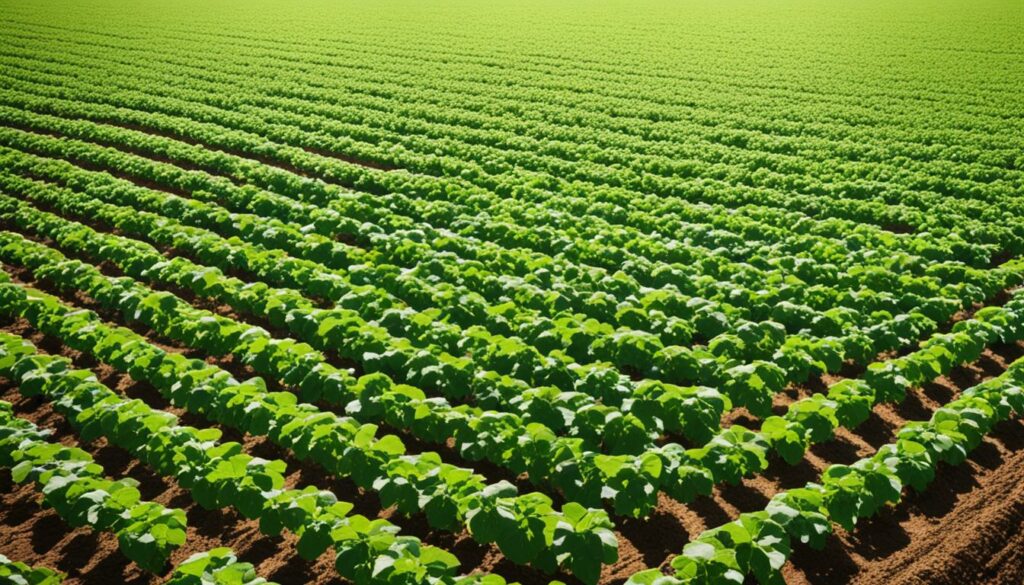
Care for the environment is vital in farming. The use of synthetic herbicides from the 1950s made weed control easier. Today, the top five herbicides in Saskatchewan have 65% less environmental impact than in the past. They also use 45% less of the main ingredient.
GM herbicide-tolerant tech lets farmers use less soil tillage. This is better for the land and supports sustainable farming.
Farmers need to make farming economically sustainable. Glyphosate was a big find for easy weed control, cutting costs significantly. But some weeds now resist it, so farmers need other strategies.
Multi-layer organic farming is a great example. It makes better use of space and resources. This way, farmers can make more money without needing more land. Plus, it lowers the need for pesticides, saving on costs and boosting profits.
Biotech addresses fairness and health in food. Multi-layer organic farms support the market’s desire for clean, sustainable food. They also increase crop value, helping farmers make a steady living and cut financial risks.
This approach is growing in popularity because it’s good for people and the earth.
Conventional agriculture struggles with several challenges. These include the effects of climate change on crops, poor soil health, and handling pests and diseases. These issues are key for stable and fruitful food production.
Climate change’s effect on crops is clear. It brings about irregular weather, harsh droughts, and severe floods. These changes endanger both crop growth and our food assurance worldwide. Parts of the world that rely heavily on farming, like sub-Saharan Africa, face significant risks. They often can’t keep up with these fast changes, urging the need for new farming techniques.
Maintaining soil health is crucial for crop yields. Yet, harsh farming practices have worsened soil health, leading to the loss of farmable land. This has caused a drop in soil fertility and increased soil erosion. Restoring soil health is vital. Technologies such as biofertilizers and using microbes can help rebuild and keep soil rich.
Controlling pests and diseases in farming is difficult. Current pest control often means using lots of chemical pesticides. But these can harm our surroundings and make pests stronger. There’s hope in biotechnological methods, like using genetically modified crops. For example, Bt cotton fights off insect pests, cutting down on harmful chemicals and making crops stronger.
Dealing with the climate change impact on crops, looking after soil health, and finding better ways to fight pests and diseases can improve how well farming systems last over time. Using biotechnological answers that match local conditions is key for the future of farming worldwide.
Biotechnology is key in making agriculture more productive. It uses advanced genetic modification and new farming practices. This helps farmers get more crops and better control their fields. Biotechnological advances increase crop strength and how much they can grow.
Genetic engineering has changed the game for farming. It lets us make crops that can fight off diseases and are more nutritious. Through methods like adding specific genes, we can quickly make new types of plants. This beats old ways that mixed up lots of genes but weren’t as effective.
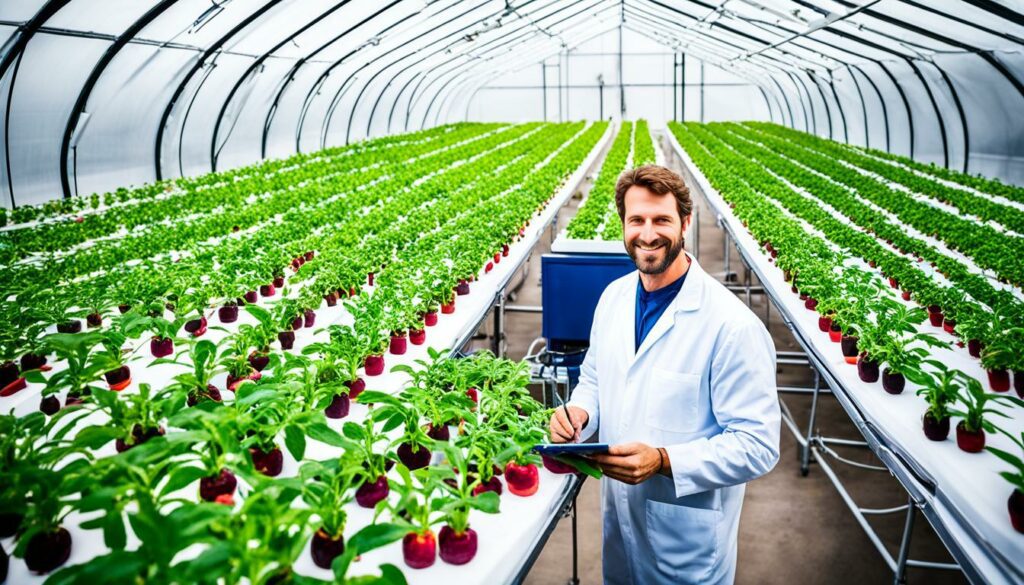
In the US in 2012, most corn, cotton, and soybeans were biotech crops. These plants grow more, need fewer pesticides, and resist pests better. The US Department of Agriculture keeps track of this, showing how popular these crops are.
Biotech isn’t just about changing genes; it’s also about better farming techniques. Making crops able to handle certain herbicides makes weeding easier. It also helps crops like papayas withstand diseases, saving entire businesses.
CRISPR gene editing is a big step forward, letting us change genes very precisely. This helps crops like rice have more beta-carotene and improves oils in plants. It’s great for farmers and customers alike.
So, biotechnology is key for today’s agriculture. It brings new generations of plants and farming that are more productive and sustainable. This is a big step forward for growing our foods.
Biotechnology has changed the way we farm today by boosting crop yields. Looking at real-world biotechnology crop successes shows how powerful these new techniques are. We will explore some amazing crop yield case studies and hear from farmers’ biotech experiences.
In the USA, biotech crops have become very common. By 2012, about 88% of corn, 94% of cotton, and 93% of soybeans were made through biotechnology. The USDA says they’re safe to eat and use, and they work really well in the fields.
The use of glyphosate-resistant crops, for example, has led to better weed control. This has meant more crops are saved, with less lost to weeds, and overall, it has increased productivity.
Farmers worldwide have seen big improvements thanks to biotechnology. A lot of these success stories come from developing countries. In India, planting 7.6 million hectares of Bt cotton helped 5 million farmers. They saw their yields jump by 31% and insecticide use drop by 39%. This not only helped their income but also the environment.
Some crops now give more oil, as high as a 90% increase. This is all thanks to biotechnology’s new techniques. The table below highlights the benefits of certain biotechnological crops:
| Crop Type | Biotech Trait | Yield Increase | Insecticide/Pesticide Reduction |
|---|---|---|---|
| Corn | Herbicide Tolerance | 20% | 30% |
| Cotton | Insect Resistance (Bt) | 31% | 39% |
| Soybeans | Disease Resistance | 25% | 30% |
Looking at the crop yield case studies and farmers’ biotech experiences really highlights biotechnology’s big impact. It’s crucial for a strong agriculture, helping with food security and farmers’ lives worldwide. We are still learning from the journey of real-world biotechnology crop successes, and it’s changing our farming dramatically.
Biotechnology has changed how we fight pests and diseases in crops. We use genetic changes to make crops less reliant on pesticides. This helps our environment and keeps our food healthy.
We add genes to crops that make them naturally fight off certain pests and diseases. This includes Bt cotton. Bt cotton has a special gene from Bacillus thuringiensis that kills pests.
This method is also used to help crops fight diseases. By adding genes that strengthen plants’ defences, we reduce the need for chemical sprays.
Genetically modified crops are very popular, especially in the US. In 2012, most corn, cotton, and soybeans grown there were modified. The benefits are clear: less pest damage, more food, and more income for farmers.
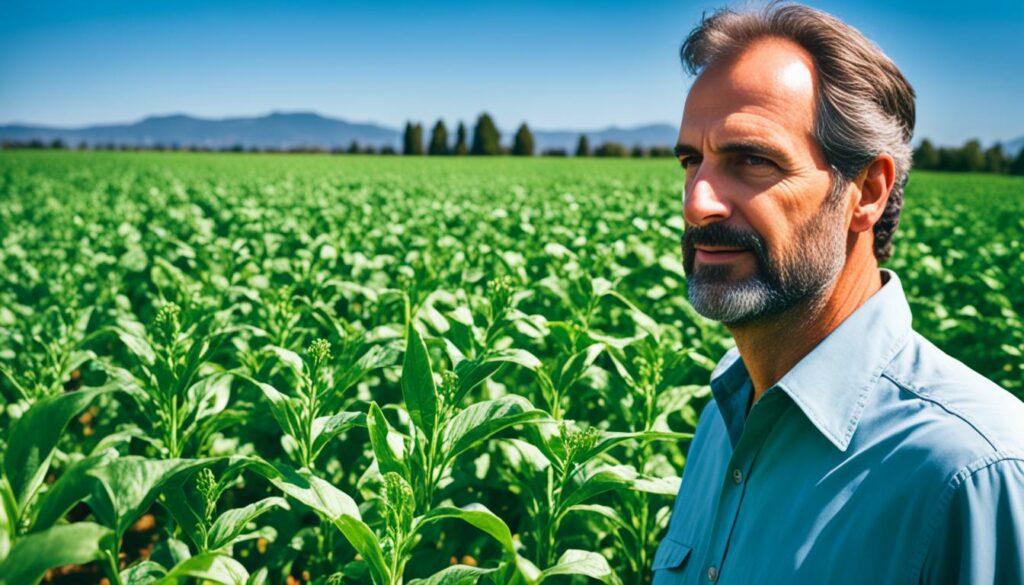
Around the world, more and more farmers are growing biotech crops. Government agencies like the USDA and the FDA make sure these crops are safe. They help us use biotechnology wisely.
| Crop | Genetic Modification | Benefits |
|---|---|---|
| Bt Cotton | Incorporation of Bacillus thuringiensis gene | Reduced pesticide use, increased yield |
| Bt Corn | Bt gene for pest resistance | Improved resistance to corn borer, reduced crop loss |
| Papaya | Ringspot virus resistance gene | Protection from papaya ringspot virus, improved production |
| Soybean | Herbicide tolerance gene | Efficient weed management, increased yield |
Biotechnology in farming has opened new ways to boost soil health. This, in turn, raises land productivity. Key advances include biofertilisers, biopesticides, and helping microbes. They make farming sustainable, enrich soil’s fertility, and support crop growth.
Biofertilisers are a key eco-friendly option over chemicals. They use natural organisms to feed plants. This adds to soil quality, holds more water, and improves nutrient flow. Thanks to biotech for soil, farmers enjoy better soil and bigger harvests.
Helpful microorganisms are used to better soil in microbial interventions. These act like probiotics but for the soil. Research shows their big benefits in plant growth, getting more nutrients, and fighting plant diseases.
Such methods show how vital biotech is in farming right. By adding the right microbes, soil health and ecosystems are kept strong. This boosts crop yield and cuts down on the harm from chemicals.
| Biotechnological Solutions | Benefits |
|---|---|
| Biofertilisers | Improved nutrient availability, enhanced soil structure, increased water retention |
| Biopesticides | Reduced chemical use, targeted pest control, minimal environmental impact |
| Microbial Agriculture Interventions | Enhanced plant growth, better nutrient uptake, suppression of soil-borne diseases |
These methods prove how powerful biotech is for soil health. As techniques advance, using these methods will be key to a strong, growing, and green future in agriculture.
Modern biotechnology is changing how we handle nutrients in farming. It’s creating crops filled with nutrients and making them even better through technology. We’re seeing not only more food but also better quality. This aims to tackle the lack of nutrition around the world
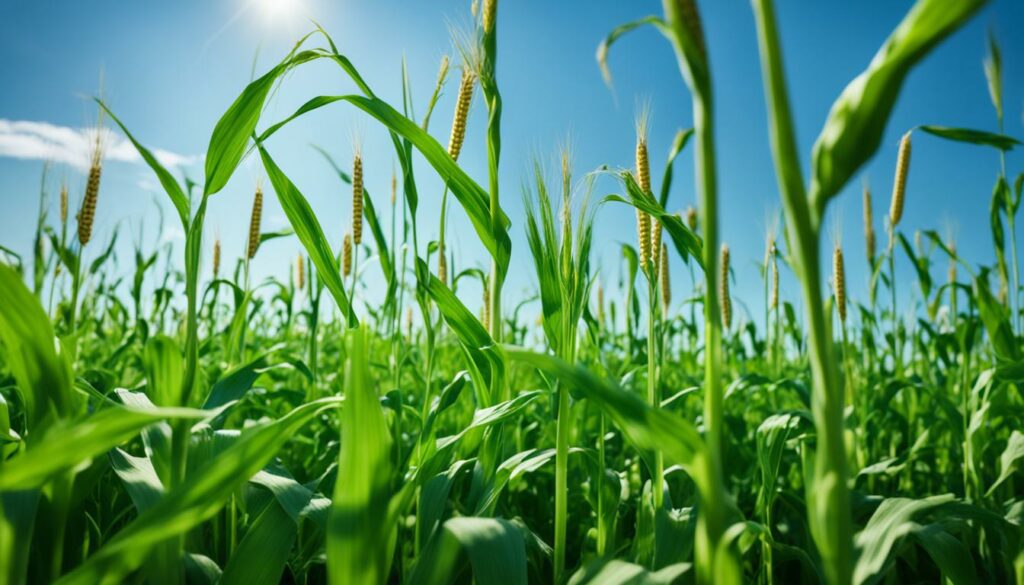
Biotechnological advancements are behind the fortification of crops. Through genetic modification, important nutrients are added to staple foods. A famous example is Golden Rice, enhanced with beta-carotene to fight vitamin A shortage. This shows how biotech fortification can help areas lacking in specific nutrients.
Biotechnology doesn’t just fortify crops, it also makes them nutrient-rich. By changing genes, key minerals and vitamins are added to plants. It means crops are healthier to eat and stronger against tough environment conditions.
In the United States, these technologies are already well-embraced. In 2012, a large part of major crops like corn, cotton, and soybeans were biotech. This shows the big opportunity we have in enhancing crops’ strength and nutrients.
| Year | Crop | Biotech Plantings (%) |
|---|---|---|
| 2012 | Corn | 88% |
| 2012 | Cotton | 94% |
| 2012 | Soybeans | 93% |
The U.S. Department of Agriculture’s stats show that trust in biotechnology is growing. This is crucial as our planet’s population is set to reach 9 billion by 2030. Enhanced biotech crops are key in meeting our food and nutritional needs.
Global warming is a big threat to plants. It brings changing weather, like different temperatures and rainfall. It also leads to more pests. These issues make growing food harder when the world needs more. Biotechnology is offering abiotic stress solutions. It helps crops survive despite tough conditions, which old farming ways couldn’t manage.
Creating drought resistance biotech crops is a major step forward. As the world gets hotter, droughts are more common. These crops are designed to use water better. They help us keep up food production, even in dry places. They have special features, like better roots and ways to protect themselves, that let them grow with less water.
Breeding crops that can handle more salt is also key. With higher temperatures, the ground’s water gets saltier. This hurts regular crops. Biotech crops that can deal with salt help sustain food growth. They grow well even in salty areas, opening up more places to grow food.
Using biotechnology is crucial to manage climate change’s effects. It lets us create solutions for many problems. With abiotic stress solutions, we build a strong system for farming. This system can feed more people even when the climate is changing.
| Abiotic Stress | Impact on Crops | Biotech Solution |
|---|---|---|
| Drought | Reduces crop productivity significantly in the next 50 years | Drought-resistant biotech crops |
| Salinity | Negatively impacts plant growth and seed formation | Salt-tolerant crop varieties |
| Heat, Floods, Frost | Significantly affects crop yield and quality | Innovative stress-resistant crops |
Working with biotech not only secures crop production. It also guides us to farm in a way that’s better for the Earth. This lets us handle the changing climate well and keep growing food strongly.
Climate change seriously challenges farming, making it crucial to adapt. Solutions like climate-resilient biotech crops are key. They help keep farming sustainable, ensure we have enough to eat, and offer new ways for farmers to manage crops.
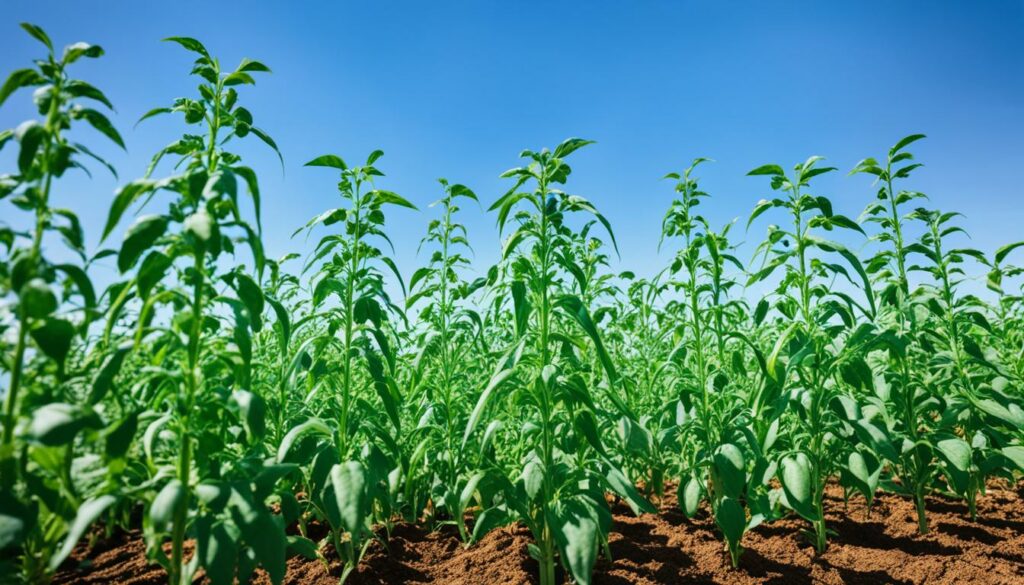
It’s clear we must adapt agriculture to climate change. In the U.S. in 2018, farming and forestry caused about 10.5% of greenhouse gases. This fact shows why we need crops that can handle climate challenges. Drought-resistant corn, for example, is doing well in dry parts of the U.S. Drought-resistant wheat is also being used in South America.
Agricultural biotechnology isn’t just about plants. It involves animals too. For example, by using genetic engineering, they’re breeding cattle that can withstand heat. These efforts boost crop yields and improve the food we get from farms. They also help in smaller studies.
New ways to manage crops are crucial for dealing with climate change. Crops that resist weeds, thanks to technology, are one example. They make farming more efficient and cut down on harmful weed killers. Technology also lets us grow disease-resistant crops. This means we can use fewer pesticides, supporting the planet.
Golden Rice is a key example of how crops can benefit us. Scientists added genes to rice, making it good for Vitamin A. This helps fight against Vitamin A deficiency. The use of CRISPR and other advanced technologies promise even more in the future. They will bring us new biotech products that meet the challenges of farming in the years to come.
With the global population predicted to hit 9 billion by 2030, we need to be prepared. This, alongside a hotter planet, makes using biotechnology in farming more important than ever. As we move forward, biotechnology will play a major role in keeping our food supply safe and stable.
The way people feel about GM crops is still changing. Lots of studies show we worry about what GM crops might do to the environment and our health. A 2006 study in the U.S. found that many consumers were unsure and worried about GM food. Another study in 2013 pointed out that Europe and North America see GM crops differently. To change minds, we need to teach people more about GM crops. This means giving them information that’s easy to understand.
Dealing with worries about genetic modification needs many actions. In 2014, a study looked at how common GM feed is and whether it’s safe and works well. A 2011 study in Europe showed that farmers are slowly becoming more accepting of GM crops. They are swayed by the benefits and how risks can be lowered. Talking openly with scientists, farmers, and the public is key. It can help get rid of wrong information.
Teaching people about biotechnology crops is very important. A study in 2012 looked at Europe and found laws and misunderstandings are big obstacles. A survey in China showed that not many people really understand how GM works. Most thought the news was bad. We must use the Internet and other big platforms to teach the truth. This way, people make up their minds based on real facts about biotechnology.
| Year | Study Focus | Key Findings |
|---|---|---|
| 2006 | U.S. Consumer Attitudes | High concern and uncertainty about GM crops |
| 2011 | European Farmers’ Attitudes | Growing but cautious acceptance of GM crops |
| 2013 | EU and North America Comparison | Significant differences in GM crop acceptance |
| 2014 | Genetically Engineered Feedstuffs | Examined safety and prevalence |
| 2016 | Support in China | Support ratio dropped to 0.29 |
To improve how people see GM crops, we need to tackle their concerns fully. We must also share good information about biotechnology crops. This will help the public know the truth and support new, better ways of farming.
The future of plant biotechnology is bright. It’s lit up by CRISPR genome editing in farming. This tech is a game-changer, making crops better and tougher than before, just like tailoring a suit to fit perfectly.
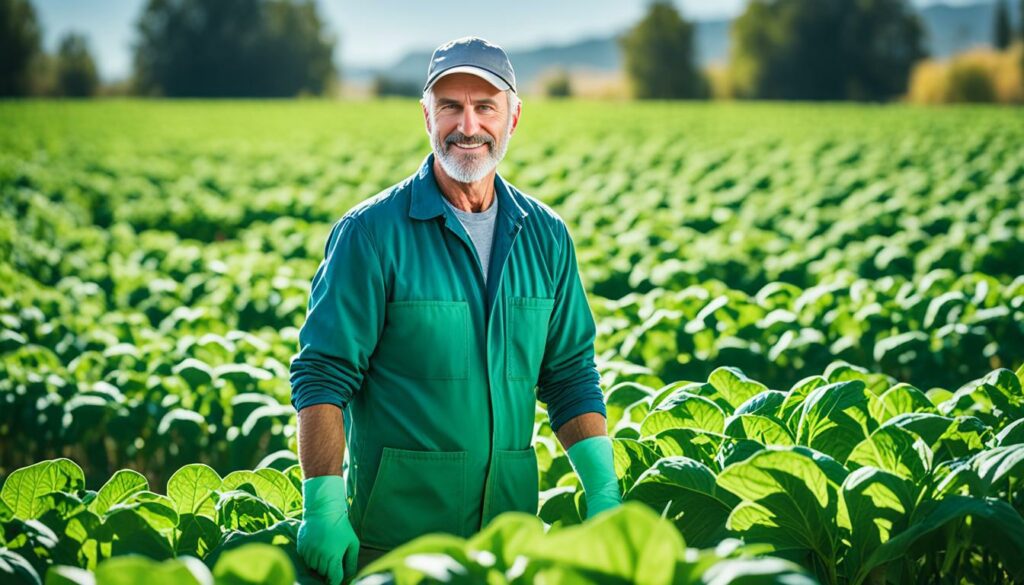
CRISPR-based gene editing is at the heart of a new era in farming. It lets scienstists tweak plant genes, making them more nutritious, able to fight diseases, and tougher against the weather. This not only speeds up making new types of food but also makes sure they’re safe and widely welcomed.
The future of farming looks exciting with tech to make plants resist droughts and salty soils. Such crops will help us face the challenges of a changing climate. And by making plants stronger against bugs and diseases, we’ll use fewer harmful chemicals, making the environment happier.
Already, many farmers around the world use GM crops to the tune of 189.8 million hectares by 2017. This shows plant technology is growing fast and being liked. Now, new plant tech aims to solve food problems and make farming strong against troubles. With CRISPR and other cool plant tech, we’re on our way to a better, more reliable food future.
Biotechnology is key to securing our food and protecting the environment. It meets the world’s need for more food and stronger crops. 60–70 percent of what we eat is from biotech crops, like corn and soybeans in the USA.
The use of “Bt” crops, and ones that withstand weed killers, shows how well biotechnology works. It has made crops survive droughts and become more nutritious. This helps fight hunger and malnutrition worldwide.
Looking forward, biotechnology is crucial for sustainable farming. It helps make planting and growing crops more efficient. By using technology and genetic knowledge, we can make better farming decisions. This creates a stronger future for farming.
Even though some people are unsure about GM crops, we can build trust by being open and honest. Keeping the public informed and involving them in discussions helps. This way, biotechnology can keep improving our farms for the better.
Agricultural biotechnology involves using science to boost crop yields and make farming more efficient. It’s vital for tackling issues like disease in plants, nutrient shortages, and looking after the environment. This helps ensure there’s enough food for everyone.
Agriculture has been using biotechnology for a long time, starting with basic breeding. In recent years, though, scientists have been able to make very specific changes at the gene level. This has helped create crops that can grow in tough conditions and keep us fed.
Biotechnology’s work means some crops need less chemical help to grow, like pesticides and fertilisers. It encourages using things like biofertilisers and biopesticides that are kinder to the earth. These practices help keep the soil and water healthy, which is good for everyone.
Farming faces big problems like climate change and soil that’s getting worse, leading to less food. Biotechnology steps in with things like stronger crops that can fight off pests and diseases. This helps make sure we have enough to eat and that farming is sustainable for the future.
Scientists use cutting-edge tools like CRISPR to give crops important features. These include making them able to fight off pests or survive weed killers. With these techniques, we can make crops healthier and more productive.
Take glyphosate-resistant crops, for instance. They manage weeds better and grow more produce. Then there are crops, like papayas, made tough against a harmful virus. These cases show just how big an impact biotechnology can have on farming’s success.
By changing crops at the genetic level, we can make them fight off pests naturally. This cuts down on using harmful chemicals. A good example is Bt cotton, which makes its own pest-killing toxin.
Biotech introduces beneficial microbes to the soil with products like biofertilisers. They help plants grow better without harsh chemicals. That means the land stays fertile and healthy, which is great news for farming.
It allows us to add important nutrients to crops. For example, Golden Rice helps fight vitamin A lack by having extra beta-carotene. This makes the food of better quality and more nutritious for people to eat.
Abiotic stresses are things like drought and salty soil that harm plants. Biotechnology creates crops that can survive these conditions, ensuring food is still grown. This is key for maintaining a good food supply around the world.
By developing crops that can handle different weather patterns, biotechnology supports farmers. These innovations include better ways to care for the land and crops that cope well with changing weather. They make sure that food production remains stable despite the challenges of climate change.
People worry about the effects of GM crops on the environment and health. Open talk, solid research, and education can calm these fears. Sharing correct information and dispelling misunderstandings about biotechnology is crucial.
We’re looking at even more advanced ways to edit genes, like using CRISPR. These methods promise crops that are even better suited for farming, with higher yields and the strength to endure tough conditions. They are key for continuing to advance agriculture in a sustainable way.